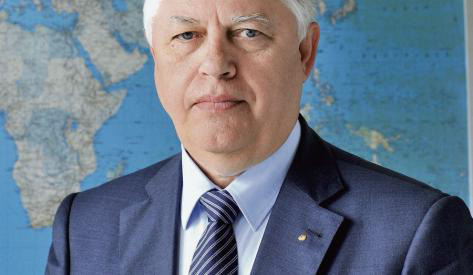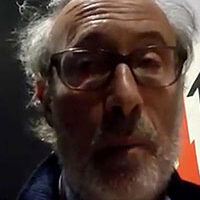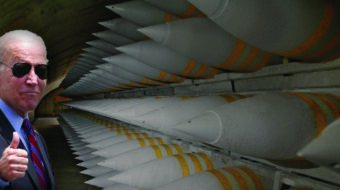
An interview with Petro Symonenko
This article originally appeared in French in l’Humanité: Petro Symonenko: « Il y a une hystérie anti-communiste en Ukraine depuis le coup d’état » . Translated by Richard Pond
The leader of the Ukrainian Communist Party (KPU), Petro Symonenko, was the target of a murder attempt by far-right militiamen on 16th May in Kiev. He bears witness in this interview to the democratic collapse his country has undergone.
Do you recognize the result of the presidential election, which saw Petro Poroshenko elected in the first round?
PS. First of all, the KPU condemns the bloodbath in the region of Donbass. We demand an immediate end to the war, the withdrawal of troops as well as of police units and security forces (SBU). Finally, we request that round-table discussions be held on the situation in that region.
As far as this election is concerned, we only partially recognize it, because not every region was able to participate in this poll. There was also pressure put on the electoral commission and the candidates.
As for Poroshenko, he’s an oligarch, so he’ll pursue this war in order to defend the current regime’s interests. He is also the Americans’ man. The U.S. has backed this process and it considers Ukraine to be a site of geostrategic interest. After Ukraine’s independence in 1991, Washington invested five billion dollars here. So a lot of high officials currently in office were trained in the United States, just as the armed militias that operated at Maidan were. This subject has been documented.
Contrary to the situation in Crimea, where the question of national identity was foremost, isn’t it more of an economic and social question in the case of the Donbass region?
PS. Yes, you’re quite right, and besides, we can already see the negative consequences of the policy pursued by the interim government. A large number of companies now no longer have production contracts and have had to suspend their activities. Donbass is the most industrialized region of Ukraine: energy, chemicals, the arms industry, etc. This is why the economic policy choice that Ukraine faces regarding the West or Russia is crucial for the region, and the referendum on 11th May isn’t a representation of Donbass citizens’ desire for separatism but rather an act of protest against the Kiev regime.
Do you recognize these popular referenda and their results both in Crimea and in the East of Ukraine?
PS. The KPU has as one of its principles the defense of Ukraine’s territorial integrity. But it defends, too, the principle that citizens can decide their own fate by means of referenda.
In Crimea, citizens denounced the increasingly fascist nature of the regime and its policies on NATO and the IMF. They used their constitutional rights to defend their own interests. The KPU had, however, proposed that politicians should travel from Kiev to Crimea to organize a round table there to hear Crimeans’ grievances. Unfortunately, the fascist national government refused. In any case, Kiev’s decision to arm 10,000 Tatar irregulars set the powder keg alight. The loss of Crimea, then, is very much the result of the sterile and criminal policies of this government, which has been content to lay the blame on Russia.
What is the KPU’s policy on the question of economic integration with Europe versus integration with Russia?
PS. Speaking personally, I am convinced that without mutually beneficial relations with Russia, Ukraine has no future. This is a sentiment that is reinforced when we examine the situation in Bulgaria, Romania, the Balkans, and also in Greece, Portugal or Spain, which chose the European Union. Before the crisis, the KPU had asked for an analysis to be carried out on the consequences of these two choices both on an economic level and socially. No government did so. The KPU also proposed the holding of a referendum. I personally met a number of European commissioners in order to explain to them that if no such consultation were organized, a bloodbath would result. But the pro-EU opposition went to court to prevent a referendum from coming about.
Your party has 114,000 members and received 13 per cent of the vote in the 2012 parliamentary elections. So why, in this situation, did it decide to withdraw from the presidential race?
PS. After the coup d’état, we witnessed the formation of illegal armed militias that imposed their rule through violence and political terror. Opposition candidates were banned from campaigning and the media were severely censored. In Odessa, the arson that killed more than forty people rocked the whole world. In Mariupol, the regime opened fire on those celebrating the 9th May (marking the victory over Nazism).
There has also been anti-Communist hysteria since the coup d’état. Comrades have been assaulted. Some have been taken into the woods and beaten. Party buildings have been damaged or requisitioned by the regime’s fascist militias. A few days after the presidential poll, there is even a procedure for banning the Communist Party; this was initiated by Ukraine’s attorney general, Oleh Makhnitsky, a member of the far-right Svoboda party. For all these reasons and in the name of the Ukrainian Communist Party, I call on France to take stock of what is really going on in my country.
Received by the Left Front
Petro Symonenko was received by the Left Front last Wednesday at the National Assembly so that he could share his account of the situation in Ukraine. Additionally, the French Communist Party leader Pierre Laurent has invited the KPU to participate at the European Left meeting in Brussels so as to keep member-parties informed and to develop coordination between the KPU and the Party of the European Left. The French Communist Party also responded favorably to the KPU’s requests for legal aid in the face of the threatened ban that it is confronting.
Photo: Petro Symonenko. l’Humanité

MOST POPULAR TODAY

High Court essentially bans demonstrations, freedom of assembly in Deep South

Resource wars rage in eastern Congo, but U.S. capitalism only sees investment opportunity

U.S. imperialism’s ‘ironclad’ support for Israel increases fascist danger at home

UN warns that Israel is still blocking humanitarian aid to Gaza








Comments